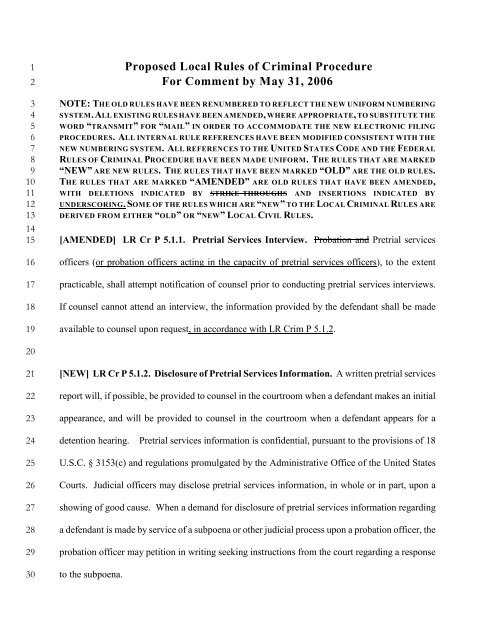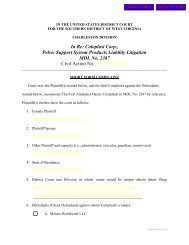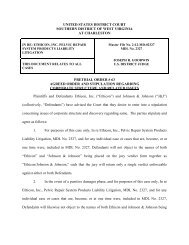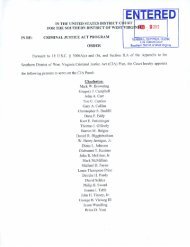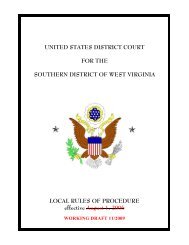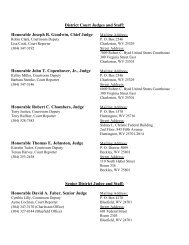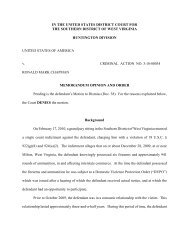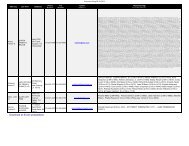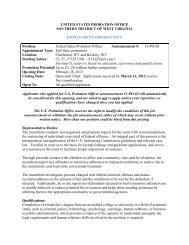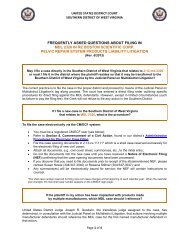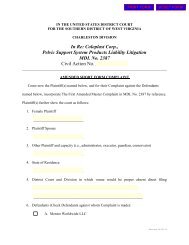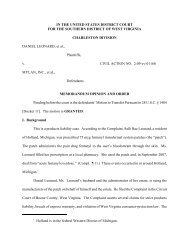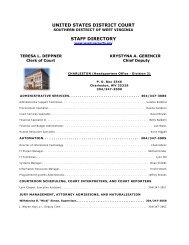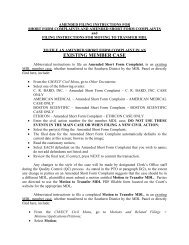local rules of criminal procedure - Southern District of West Virginia
local rules of criminal procedure - Southern District of West Virginia
local rules of criminal procedure - Southern District of West Virginia
You also want an ePaper? Increase the reach of your titles
YUMPU automatically turns print PDFs into web optimized ePapers that Google loves.
1 Proposed Local Rules <strong>of</strong> Criminal Procedure<br />
2 For Comment by May 31, 2006<br />
3 NOTE: THE OLD RULES HAVE BEEN RENUMBERED TO REFLECT THE NEW UNIFORM NUMBERING<br />
4 SYSTEM. ALL EXISTING RULES HAVE BEEN AMENDED, WHERE APPROPRIATE, TO SUBSTITUTE THE<br />
5 WORD “TRANSMIT” FOR “MAIL” IN ORDER TO ACCOMMODATE THE NEW ELECTRONIC FILING<br />
6 PROCEDURES. ALL INTERNAL RULE REFERENCES HAVE BEEN MODIFIED CONSISTENT WITH THE<br />
7 NEW NUMBERING SYSTEM. ALL REFERENCES TO THE UNITED STATES CODE AND THE FEDERAL<br />
8 RULES OF CRIMINAL PROCEDURE HAVE BEEN MADE UNIFORM. THE RULES THAT ARE MARKED<br />
9 “NEW” ARE NEW RULES. THE RULES THAT HAVE BEEN MARKED “OLD” ARE THE OLD RULES.<br />
10 THE RULES THAT ARE MARKED “AMENDED” ARE OLD RULES THAT HAVE BEEN AMENDED,<br />
11 WITH DELETIONS INDICATED BY STRIKE-THROUGHS AND INSERTIONS INDICATED BY<br />
12 UNDERSCORING. SOME OF THE RULES WHICH ARE “NEW” TO THE LOCAL CRIMINAL RULES ARE<br />
13 DERIVED FROM EITHER “OLD” OR “NEW” LOCAL CIVIL RULES.<br />
14<br />
15 [AMENDED] LR Cr P 5.1.1. Pretrial Services Interview. Probation and Pretrial services<br />
16 <strong>of</strong>ficers (or probation <strong>of</strong>ficers acting in the capacity <strong>of</strong> pretrial services <strong>of</strong>ficers), to the extent<br />
17 practicable, shall attempt notification <strong>of</strong> counsel prior to conducting pretrial services interviews.<br />
18 If counsel cannot attend an interview, the information provided by the defendant shall be made<br />
19 available to counsel upon request, in accordance with LR Crim P 5.1.2.<br />
20<br />
21 [NEW] LR Cr P 5.1.2. Disclosure <strong>of</strong> Pretrial Services Information. A written pretrial services<br />
22 report will, if possible, be provided to counsel in the courtroom when a defendant makes an initial<br />
23 appearance, and will be provided to counsel in the courtroom when a defendant appears for a<br />
24 detention hearing. Pretrial services information is confidential, pursuant to the provisions <strong>of</strong> 18<br />
25 U.S.C. § 3153(c) and regulations promulgated by the Administrative Office <strong>of</strong> the United States<br />
26 Courts. Judicial <strong>of</strong>ficers may disclose pretrial services information, in whole or in part, upon a<br />
27 showing <strong>of</strong> good cause. When a demand for disclosure <strong>of</strong> pretrial services information regarding<br />
28 a defendant is made by service <strong>of</strong> a subpoena or other judicial process upon a probation <strong>of</strong>ficer, the<br />
29 probation <strong>of</strong>ficer may petition in writing seeking instructions from the court regarding a response<br />
30 to the subpoena.
1 [NEW] LR Cr P 5.1.3. Modification <strong>of</strong> Conditions <strong>of</strong> Pretrial Release. The pretrial services<br />
2 or probation <strong>of</strong>ficer may, in the exercise <strong>of</strong> his/her discretion, meet with the defendant and defense<br />
3 counsel and modify conditions <strong>of</strong> release. Following such meeting, if any, a Consent to Modify<br />
4 Conditions <strong>of</strong> Release (PS 42) shall be completed and submitted to the judicial <strong>of</strong>ficer for signature<br />
5 and filing.<br />
6<br />
7 [NEW] LR Cr P 7.1. Assignment <strong>of</strong> Cases. Cases filed shall be assigned by the clerk to a judge<br />
8 at the direction <strong>of</strong> the Chief Judge or through the use <strong>of</strong> random electronic methods. The clerk shall<br />
9 not reveal the case assignment allocation or sequence <strong>of</strong> the electronic method to anyone, unless<br />
10 ordered to do so by a district judge. A record <strong>of</strong> all assignments made shall be kept by the clerk.<br />
11<br />
12 [NEW] LR Cr P 7.2. Reassignment <strong>of</strong> Cases. The clerk is authorized to sign orders to reassign<br />
13 cases when needed and as directed by a judge <strong>of</strong> this court.<br />
14<br />
15 [AMENDED] LR Cr P 10.1. Arraignments and Plea. (a) Notice <strong>of</strong> Date and Time. It is the<br />
16 duty <strong>of</strong> the government to give The attorney for the government shall timely notify the defendant<br />
17 <strong>of</strong> the date and time <strong>of</strong> defendant’s arraignment on and plea to an indictment. A copy <strong>of</strong> the notice<br />
18 shall be furnished The government attorney shall furnish a copy <strong>of</strong> the notice concurrently to<br />
19 defendant’s counsel if counsel’s name and address are shown on the docket or known to the<br />
20 government. When the indictment is based on substantially similar allegations that form the basis<br />
21 <strong>of</strong> an earlier complaint before a magistrate judge, the government attorney shall notify counsel who<br />
22 appeared for defendant before the magistrate judge <strong>of</strong> the date and time <strong>of</strong> the arraignment. When<br />
23 the United States Attorney has knowledge that a If a defendant is without counsel, that fact shall<br />
Page 2 <strong>of</strong> 26
1 be promptly brought to the attention <strong>of</strong> the government attorney shall promptly notify the<br />
2 appropriate judicial <strong>of</strong>ficer <strong>of</strong> that fact, so early provision <strong>of</strong> counsel may be considered.<br />
3 (b) Notice <strong>of</strong> motion to dismiss. The United States Attorney government attorney shall serve<br />
4 on the defendant’s counsel or on an unrepresented defendant a notice <strong>of</strong> a motion to dismiss a<br />
5 complaint pending before a judicial <strong>of</strong>ficer.<br />
6 (c) No further notice. No other or further notice <strong>of</strong> arraignment and plea or motion to<br />
7 dismiss need be given by the clerk except on order <strong>of</strong> the court.<br />
8<br />
9 [NEW] LR Cr P 12.1. Pretrial Motions. (a) Date for filing pretrial motions in lieu <strong>of</strong> standard<br />
10 request for discovery. If a defendant does not elect to use the standard request for discovery, the<br />
11 magistrate judge shall, at arraignment, set a date within 20 days <strong>of</strong> arraignment for filing<br />
12 defendant’s pretrial motions.<br />
13 (b) Date for filing pretrial motions in addition to standard request for discovery. If<br />
14 defendant elects to use the standard request for discovery, defendant must file any additional<br />
15 pretrial motions (i.e., non-discovery) by the date established in the Arraignment Order and Standard<br />
16 Discovery Request Form (Appendix <strong>of</strong> Forms) available from the clerk and on the court’s website.<br />
17 (c) Time for response to pretrial motions. The government has 7 days to respond to motions<br />
18 filed by defendant under paragraphs (a) and (b) <strong>of</strong> this rule.<br />
19 (d) Pretrial hearing. The pretrial hearing will be held at least 14 days prior to trial, unless<br />
20 otherwise ordered by the court sua sponte or on motion for good cause. If the parties agree a<br />
21 hearing is not necessary, they must inform the district judge immediately. If the pretrial hearing<br />
22 requires the taking <strong>of</strong> evidence, the parties must notify the district judge in advance.<br />
Page 3 <strong>of</strong> 26
1 (e) Courtroom technology. If any courtroom technology is required , counsel must request<br />
2 any such technology for use at trial or other proceeding and make a certification that the court’s<br />
3 technology staff has been notified. The certification regarding such notification shall be filed with<br />
4 the clerk no later than 5 business days before the scheduled commencement <strong>of</strong> the trial or other<br />
5 proceeding.<br />
6<br />
7 [AMENDED] LR Cr P 16.1. Arraignment and Standard Discovery Requests. (a) Standard<br />
8 discovery request form. At arraignment on an indictment, or on an information or complaint in a<br />
9 misdemeanor case, counsel for the defendant and the government may make standard requests for<br />
10 discovery as contained in the Arraignment Order and Standard Discovery Request form (Appendix<br />
11 <strong>of</strong> Forms) available from the clerk and on the court’s website. The form shall be signed by counsel<br />
12 for the defendant and the government and entered by the magistrate judge.<br />
13 (b) Reciprocal discovery. If counsel for the defendant requests discovery under FR Cr P<br />
14 16(a)(1)(E), (F) or (G), in an Arraignment Order and Discovery Request form, the defendant is<br />
15 obligated to provide any reciprocal discovery that may be available to the government under FR Cr<br />
16 P 16(b)(1)(A), (B) or (C).<br />
17 (c) Time for government response. Unless the parties agree otherwise, or the court so<br />
18 orders, within 10 days <strong>of</strong> the Standard Discovery Request, the government must provide the<br />
19 requested material to counsel for the defendant and file with the clerk a written response to each<br />
20 <strong>of</strong> defendant's requests with the clerk.<br />
21 (d) Time for reciprocal discovery response. All reciprocal discovery due the government<br />
22 must be provided by defendant within 10 days <strong>of</strong> the receipt <strong>of</strong> the materials and the filing and<br />
23 serving <strong>of</strong> responses in paragraph (c). Defendant must provide all reciprocal discovery due the<br />
Page 4 <strong>of</strong> 26
1 government within 10 days <strong>of</strong> receiving the materials and the filing and serving <strong>of</strong> responses in<br />
2 paragraph (c).<br />
3 (e) Defense discovery request deemed speedy trial motion. Defendant must file all<br />
4 additional motions within 10 days <strong>of</strong> providing materials and filing and serving <strong>of</strong> responses in<br />
5 paragraph (c). Any request made by the defendant pursuant to this rule will be deemed a motion<br />
6 under the provisions <strong>of</strong> the Speedy Trial Act, 18 U.S.C. § 3161.<br />
7 (f) Duty to supplement. If defendant does not make the standard request for discovery<br />
8 pursuant to paragraph (a), the magistrate judge shall, at arraignment, set a date within 20 days <strong>of</strong><br />
9 arraignment for filing <strong>of</strong> defendant's pretrial motions. All duties <strong>of</strong> disclosure and discovery in this<br />
10 rule are continuing. The parties must produce any additional discovery as soon as they receive it,<br />
11 and in no event later than the time for such disclosure as required by law, rule <strong>of</strong> <strong>criminal</strong><br />
12 <strong>procedure</strong>, or order <strong>of</strong> the court, and without the necessity <strong>of</strong> further request by the opposing party.<br />
13 (g) The government shall have 7 days to respond to motions filed by defendant under<br />
14 paragraphs (e) and (f).<br />
15 (h) At arraignment, the magistrate judge shall establish a date and time for a pretrial hearing<br />
16 before the assigned district judge. The pretrial hearing shall be held at least 14 days prior to trial,<br />
17 unless otherwise ordered by the court sua sponte or on motion for good cause. If the parties agree<br />
18 a hearing is not necessary, they must inform the district judge immediately. If the pretrial hearing<br />
19 will require the taking <strong>of</strong> evidence, the parties must notify the district judge in advance.<br />
20 (i) Any request made by the defendant pursuant to this rule will be deemed a motion under<br />
21 the provisions <strong>of</strong> the Speedy Trial Act, 18 U.S.C. § 3161.<br />
22 (j) All duties <strong>of</strong> disclosure and discovery in this rule are continuing, and the parties must<br />
23 produce any additional disclosure and discovery as soon as it is received.<br />
Page 5 <strong>of</strong> 26
1<br />
[NEW] LR Cr P 18.1. Principal Offices. The headquarters <strong>of</strong> the United States <strong>District</strong> Court<br />
2 for the <strong>Southern</strong> <strong>District</strong> <strong>of</strong> <strong>West</strong> <strong>Virginia</strong> and its Clerk is located in the Robert C. Byrd United<br />
3 States Courthouse, Room 2400, 300 <strong>Virginia</strong> Street East, Charleston, <strong>West</strong> <strong>Virginia</strong>. The mailing<br />
4 address is P.O. Box 2546, Charleston, <strong>West</strong> <strong>Virginia</strong> 25329.<br />
5<br />
6 [NEW] LR Cr P 18.2. Divisions. The <strong>Southern</strong> <strong>District</strong> <strong>of</strong> <strong>West</strong> <strong>Virginia</strong> is composed <strong>of</strong> 23<br />
7 counties. Each <strong>of</strong> these counties is assigned to 1 <strong>of</strong> 5 administrative divisions. Each division is<br />
8 given the name <strong>of</strong> the city in the division where the court and <strong>of</strong>fices <strong>of</strong> its clerk are located. The<br />
9 divisions, addresses <strong>of</strong> division <strong>of</strong>fices, and counties comprising each division are as follows:<br />
10 Division 1: Bluefield<br />
11<br />
12 Elizabeth Kee Federal Building<br />
13 Address: Room 2303, 601 Federal Street, Bluefield, <strong>West</strong> <strong>Virginia</strong> 24701<br />
14 Mailing address: P.O. Box 4128, Bluefield, <strong>West</strong> <strong>Virginia</strong> 24701<br />
15 Counties Composing Division: Mercer, Monroe and McDowell<br />
16<br />
17 Division 2: Charleston<br />
18<br />
19 Robert C. Byrd United States Courthouse<br />
20 Address: Room 2400, 300 <strong>Virginia</strong> Street East, Charleston, WV 25301<br />
21 Mailing address: P.O. Box 2546, Charleston, <strong>West</strong> <strong>Virginia</strong> 25329<br />
22 Counties Composing Division: Boone, Clay, Jackson, Kanawha, Lincoln, Logan, Mingo, Nicholas,<br />
23 Putnam and Roane<br />
24<br />
25 Division 3: Huntington<br />
26<br />
27 Sidney L. Christie Federal Building<br />
28 Address: Room 101, 845 Fifth Avenue, Huntington, <strong>West</strong> <strong>Virginia</strong> 25701<br />
29 Mailing address: P.O. Box 1570, Huntington, <strong>West</strong> <strong>Virginia</strong> 25716<br />
30 Counties Composing Division: Cabell, Mason and Wayne<br />
31<br />
32<br />
33<br />
34<br />
35<br />
36<br />
Page 6 <strong>of</strong> 26
1 Division: 5: Beckley<br />
2<br />
3 Robert C. Byrd Federal Building and Courthouse,<br />
4 Address: Room 119, 110 North Heber Street, Beckley, <strong>West</strong> <strong>Virginia</strong> 25801<br />
5 Mailing address: P.O. Drawer 5009, Beckley, <strong>West</strong> <strong>Virginia</strong> 25801<br />
6 Counties Composing Division: Fayette, Greenbrier, Summers, Raleigh and Wyoming<br />
7<br />
8 Division 6: Parkersburg<br />
9<br />
10 Federal Office Building<br />
11 Address: Room 5102, 425 Juliana Street, Parkersburg, <strong>West</strong> <strong>Virginia</strong> 26102<br />
12 Mailing address: Room 5102, 425 Juliana Street, Parkersburg, <strong>West</strong> <strong>Virginia</strong> 26102<br />
13 Counties Composing Division: Wirt and Wood<br />
14 The court will occasionally convene in Lewisburg to deal with matters falling within either the<br />
15 Beckley or Bluefield Division.<br />
16 [This rule has been amended generally to reflect the correct address for each <strong>of</strong> the divisions].<br />
17<br />
18 [OLD] LR Cr P 23.1. Opening Statements in Criminal Trials. At the commencement <strong>of</strong> trial<br />
19 in a <strong>criminal</strong> action, the government and the defendant may make non-argumentative opening<br />
20 statements as to their theories <strong>of</strong> the case and the manner in which they expect to <strong>of</strong>fer their<br />
21 evidence. If the trial is to a jury, the opening statements shall be made immediately after the jury<br />
22 is empaneled, and, if the trial is to the court, the opening statements shall be made immediately after<br />
23 the case is called for trial; but, for good cause shown, the court, on request <strong>of</strong> the defendant, may<br />
24 defer the opening statement for a defendant until the time for commencing presentation <strong>of</strong> that<br />
25 defendant's direct evidence. Opening statements shall be subject to time limitations imposed by the<br />
26 court. If the action involves more than one defendant, the court, after conferring with the parties<br />
27 to the action, shall determine the order and time <strong>of</strong> the opening statements.<br />
28<br />
Page 7 <strong>of</strong> 26
1 [NEW] LR Cr P 26.1. Addressing the Court; Examination <strong>of</strong> Witnesses. Attorneys and pro<br />
2 se litigants must stand and speak clearly when addressing the court. Only one attorney for each<br />
3 party may participate in examination and cross-examination <strong>of</strong> a witness. With the court's<br />
4 permission, the attorney may approach a witness to present or inquire about an exhibit.<br />
5<br />
6 [OLD] LR Cr P 30.1. Jury Instructions. In all <strong>criminal</strong> cases, counsel for the defendant and for<br />
7 the government shall submit jury instructions to the court prior to the commencement <strong>of</strong> a jury trial,<br />
8 or earlier if ordered by the court. When it is necessary for counsel for the defendant to submit one<br />
9 or more jury instructions on an ex parte basis, those instructions must be disclosed to the<br />
10 government no later than the charge conference or when specified by the court. Subject to court<br />
11 approval, counsel may amend or supplement jury instructions after commencement <strong>of</strong> trial.<br />
12<br />
13 [NEW] LR Cr P 31.1. Contact with Jurors. After conclusion <strong>of</strong> a trial, no party, nor his or her agent<br />
14 or attorney, shall communicate or attempt to communicate with any member <strong>of</strong> the jury, including<br />
15 alternate jurors who were dismissed prior to deliberations, about the jury's deliberations or verdict without<br />
16 first applying for (with notice to all other parties) and obtaining, for good cause, an order allowing such<br />
17 communication.<br />
18<br />
19 [AMENDED] LR Cr P 32.1. Pretrial services and Presentence Interview. Probation and pretrial<br />
20 service <strong>of</strong>ficers, to the extent practicable, shall attempt notification <strong>of</strong> counsel prior to conducting pretrial<br />
21 service interviews. Probation and pretrial service <strong>of</strong>ficers shall notify counsel, prior to conducting the<br />
22 presentence interview <strong>of</strong> the defendant, <strong>of</strong> the date, time and place <strong>of</strong> the interview. If counsel cannot<br />
Page 8 <strong>of</strong> 26
1 attend an interview, the information provided by the defendant shall be made available to counsel upon<br />
2 request in accordance with LR Crim P 32.2.<br />
3<br />
4 [NEW] LR Cr P 32.2. Disclosure <strong>of</strong> Presentence Reports and Probation Records.<br />
5 (a) Disclosure <strong>of</strong> presentence reports. Disclosure <strong>of</strong> presentence reports is governed by 18 U.S.C.<br />
6 § 3552(d) and FR Crim P 32. Except as specifically provided by statute, rule, regulation, or guideline<br />
7 promulgated by the Administrative Office <strong>of</strong> the United States Courts, or LR Crim P 32.3, no<br />
8 confidential records <strong>of</strong> the court maintained by the probation <strong>of</strong>fice, including presentence reports<br />
9 and probation or supervised release records, shall be producible except by written petition to the<br />
10 court, particularizing the need for specific information. When a demand for disclosure <strong>of</strong><br />
11 presentence and probation records is made by way <strong>of</strong> subpoena or other judicial process to a<br />
12 probation <strong>of</strong>ficer, the probation <strong>of</strong>ficer may petition in writing seeking instructions from the court<br />
13 regarding a response to the subpoena. No disclosure shall be made except upon order <strong>of</strong> the court.<br />
14 (b) Disclosure <strong>of</strong> probation <strong>of</strong>fice recommendation. The probation <strong>of</strong>ficer shall not disclose<br />
15 to anyone other than the court the <strong>of</strong>ficer’s recommendation as to the sentence.<br />
16<br />
17 [NEW] LR Cr P 32.3 Modification or Revocation <strong>of</strong> Probation or Supervised Release.<br />
18 (a) Petition for modification or revocation. (1) A petition for modification or revocation <strong>of</strong><br />
19 probation or supervised release shall be set forth on the form adopted for that purpose by the<br />
20 Administrative Office <strong>of</strong> the United States. The petition shall be presented to the sentencing judge.<br />
21 The sentencing judge shall determine whether the petition shall be filed.<br />
Page 9 <strong>of</strong> 26
1 (2) The petition shall set forth the facts allegedly constituting the violation <strong>of</strong> probation or<br />
2 supervised release. The petition shall also seek either a summons or an arrest warrant, modification<br />
3 <strong>of</strong> the terms <strong>of</strong> release, or no action.<br />
4 (3) A petition ordered filed shall be served upon the probationer or releasee, the attorney for<br />
5 the government, and last known counsel <strong>of</strong> record except that in all cases in which prior counsel was<br />
6 appointed pursuant to the Criminal Justice Act, the Office <strong>of</strong> the Federal Public Defender shall be<br />
7 served in lieu <strong>of</strong> service upon prior counsel. Unless the court orders an arrest warrant be issued, the<br />
8 petition shall be served upon the probationer or releasee after arrest, but in no event later than the<br />
9 initial appearance.<br />
10 (b) Disclosure <strong>of</strong> evidence. The probation <strong>of</strong>ficer shall, without further request by the<br />
11 probationer, or releasee, or his/her counsel, disclose to the probationer or releasee or his/her counsel,<br />
12 all evidence against the probationer or releasee, including any potential oral statement and any<br />
13 potentially exculpatory material. Any information disclosed by the probation <strong>of</strong>ficer to an attorney<br />
14 for the government shall be promptly disclosed by the probation <strong>of</strong>ficer to probationer or releasee<br />
15 or to his/her counsel.<br />
16 (c) Recommendation for revocation <strong>of</strong> probation or supervised release. If after a hearing the<br />
17 defendant is found to have violated the terms <strong>of</strong> probation or supervised release, the probation <strong>of</strong>ficer<br />
18 may make a recommendation to the court. The reasons supporting the recommendation shall be<br />
19 disclosed to the parties if such reasons are evidence against the probationer or releasee, as shall any<br />
20 response by the probation <strong>of</strong>ficer to recommendations by counsel.<br />
21 (d) Request for modification <strong>of</strong> the terms <strong>of</strong> probation or supervised release. No terms <strong>of</strong><br />
22 probation or supervised release shall be modified upon a waiver <strong>of</strong> counsel by the probationer or<br />
23 releasee unless and until the probationer or releasee shall have consulted with counsel regarding the<br />
Page 10 <strong>of</strong> 26
1 advisability <strong>of</strong> waiving counsel. Any such waiver <strong>of</strong> counsel must certify that the probationer or<br />
2 releasee consulted with counsel prior to executing such waiver. In the alternative, waiver <strong>of</strong> counsel<br />
3 may be made by the probationer or releasee before a magistrate judge.<br />
4<br />
5 [NEW] LR Cr P 44.1. Admission <strong>of</strong> Attorneys. (a) Admission as member <strong>of</strong> bar <strong>of</strong> court. Any<br />
6 person who is admitted to practice before the Supreme Court <strong>of</strong> Appeals <strong>of</strong> <strong>West</strong> <strong>Virginia</strong> and who<br />
7 is in good standing as a member <strong>of</strong> its bar is eligible for admission as a member <strong>of</strong> the bar <strong>of</strong> this<br />
8 court. An eligible attorney may be admitted as a member <strong>of</strong> the bar <strong>of</strong> this court upon motion <strong>of</strong> a<br />
9 member (Sponsoring Attorney) who shall sign the register <strong>of</strong> attorneys with the person admitted. If<br />
10 the motion for admission is granted, the applicant shall take the attorney’s admission oath or<br />
11 affirmation, sign the attorneys’ register, and pay the clerk the admission fee.<br />
12 (b) Sponsorship <strong>of</strong> visiting attorneys by members <strong>of</strong> court. An attorney may sponsor another<br />
13 attorney for membership or for pro hac vice status (Visiting Attorney) if the Sponsoring Attorney<br />
14 is a member <strong>of</strong> the bar <strong>of</strong> this court, has an <strong>of</strong>fice for the practice <strong>of</strong> law in <strong>West</strong> <strong>Virginia</strong>, and<br />
15 practices law primarily in <strong>West</strong> <strong>Virginia</strong>.<br />
16 (c) Appearance by Assistant United States Attorneys and Assistant Federal Public Defenders.<br />
17 Any attorney employed by the United States Attorney or the Federal Public Defender for this judicial<br />
18 district must qualify as a member <strong>of</strong> the bar <strong>of</strong> this court within one year <strong>of</strong> his or her employment.<br />
19 Until so qualified, the attorney may appear and practice under the sponsorship <strong>of</strong> the appointing<br />
20 <strong>of</strong>ficer.<br />
21 (d) Appearance by federal government attorneys. Federal government attorneys who are not<br />
22 members <strong>of</strong> the bar <strong>of</strong> this court need not complete the Statement <strong>of</strong> Visiting Attorney. In cases<br />
23 where the United States Attorney is associated with other government attorneys in proceedings<br />
Page 11 <strong>of</strong> 26
1 involving the Federal government, the United States Attorney (except in student loan collection<br />
2 cases), in addition to other Federal government attorneys, shall sign all pleadings, notices, and other<br />
3 papers filed and served by the United States. All pleadings, notices, and other papers involving the<br />
4 Federal government may be served on the United States Attorney in accordance with the service<br />
5 requirements <strong>of</strong> the Federal Rules <strong>of</strong> Civil Procedure and the Federal Rules <strong>of</strong> Criminal Procedure.<br />
6<br />
7 [NEW] LR Cr P 44.2. Legal Assistance by Law Students. (a) Written consent. With the written<br />
8 consent <strong>of</strong> an indigent and his or her attorney <strong>of</strong> record, an eligible law student may appear on behalf<br />
9 <strong>of</strong> that indigent. With the written consent <strong>of</strong> the United States Attorney or his or her representative,<br />
10<br />
an eligible law student may also appear on behalf <strong>of</strong> the United States. With the written consent <strong>of</strong><br />
11 the Federal Public Defender, an eligible law student may appear on behalf <strong>of</strong> the Federal Public<br />
12 Defender. With the written consent <strong>of</strong> the Attorney General <strong>of</strong> the State <strong>of</strong> <strong>West</strong> <strong>Virginia</strong> or his or<br />
13 her representative, an eligible law student may also appear on behalf <strong>of</strong> the State <strong>of</strong> <strong>West</strong> <strong>Virginia</strong>.<br />
14 In each case in which an eligible law student appears, the consent shall be filed with the clerk.<br />
15 (b) Responsibilities <strong>of</strong> attorneys <strong>of</strong> record. An eligible law student may assist in the<br />
16 preparation <strong>of</strong> pleadings, briefs, and other documents to be filed in this court, but such pleadings,<br />
17 briefs, or documents must be signed by the attorney <strong>of</strong> record. An eligible law student may also<br />
18 participate in hearings, trials, and other proceedings with leave <strong>of</strong> court, but only in the presence <strong>of</strong><br />
19 the attorney <strong>of</strong> record. The attorney <strong>of</strong> record shall assume personal pr<strong>of</strong>essional responsibility for<br />
20 the law student's work. The attorney <strong>of</strong> record shall be familiar with the case and be prepared to<br />
21 supplement or correct any written or oral statement made by the law student.<br />
22<br />
Page 12 <strong>of</strong> 26
1 (c) Eligibility requirements. To be eligible to appear pursuant to this rule, the law student<br />
2 must:<br />
3<br />
(1) be enrolled in a law school approved by the American Bar Association;<br />
4<br />
5 (2) have successfully completed legal studies for at least 4 semesters, or the<br />
6 equivalent if the school is on some basis other than a semester basis;<br />
7<br />
8 (3) be certified by the dean <strong>of</strong> his or her law school as being <strong>of</strong> good<br />
9 character and competent legal ability. The dean's certification shall be filed<br />
10 with the clerk. This certification may be withdrawn by the dean at any time<br />
11 without notice or hearing and without any showing <strong>of</strong> cause by notifying<br />
12 the clerk in writing, or it may be terminated by the court at any time<br />
13 without notice <strong>of</strong> hearing and without any showing <strong>of</strong> cause. Unless<br />
14 withdrawn or terminated, the certification shall remain in effect for 18<br />
15 months after it has been filed with the clerk or until the law student has<br />
16 been admitted as a permanent member <strong>of</strong> the bar <strong>of</strong> this court, whichever<br />
17 is earlier;<br />
18<br />
19 (4) certify in writing to the clerk that he or she has read the Code <strong>of</strong><br />
20 Pr<strong>of</strong>essional Conduct <strong>of</strong> the American Bar Association;<br />
21<br />
22 (5) be introduced to the court by a permanent member <strong>of</strong> the bar <strong>of</strong> this<br />
23 court; and<br />
24<br />
25 (6) neither ask for nor receive any compensation or remuneration <strong>of</strong> any<br />
26 kind for services from the party assisted, but this shall not prevent an<br />
27 attorney, legal services program, law school, public defender agency, the<br />
28 State <strong>of</strong> <strong>West</strong> <strong>Virginia</strong>, or the United States from paying compensation to<br />
29 the law student, nor from making appropriate charges for such services.<br />
30<br />
31<br />
32 [NEW] LR Cr P 44.3. Representation <strong>of</strong> Parties. Every party to proceedings in this<br />
33 court, except parties appearing pro se, shall be represented by a member <strong>of</strong> the bar <strong>of</strong> this<br />
34 court and may be represented by a Visiting Attorney and Sponsoring Attorney as provided<br />
35 in these <strong>rules</strong>. A corporation or unincorporated association cannot appear pro se.<br />
36<br />
Page 13 <strong>of</strong> 26
1 [NEW] LR Cr P 44.4. Termination <strong>of</strong> Representation. No attorney who has entered an<br />
2 appearance in any <strong>criminal</strong> action shall withdraw the appearance or have it stricken from<br />
3 the record, except by order.<br />
4<br />
5 [NEW] LR Cr P 44.5. Pro se Appearances. A party who represents himself or herself<br />
6 shall file with the clerk his or her complete name and address where pleadings, notices,<br />
7 orders, and other papers may be served on him or her, and shall include his/her telephone<br />
8 number. A pro se party must advise the clerk promptly <strong>of</strong> any changes in name, address,<br />
9 and telephone number.<br />
10<br />
11 [NEW] LR Cr P 44.6. Admission <strong>of</strong> Visiting Attorneys. (a) Procedure for admission.<br />
12 Any person who has not been admitted to practice before the Supreme Court <strong>of</strong> Appeals<br />
13 <strong>of</strong> <strong>West</strong> <strong>Virginia</strong>, but who is a member in good standing <strong>of</strong> the bar <strong>of</strong> the Supreme Court<br />
14 <strong>of</strong> the United States, the bar <strong>of</strong> the highest court <strong>of</strong> any other state in the United States, or<br />
15 the bar <strong>of</strong> the <strong>District</strong> <strong>of</strong> Columbia, and who has not been convicted <strong>of</strong> a felony, shall be<br />
16 permitted to appear as a Visiting Attorney in a particular case in association with a<br />
17 Sponsoring Attorney as herein provided. The Visiting Attorney shall file with the clerk,<br />
18 at or before his or her initial appearance (including signing a pleading), the Statement <strong>of</strong><br />
19 Visiting Attorney adopted by order <strong>of</strong> this court, which is available from the clerk and on<br />
20 the court’s website, and shall pay the Visiting Attorney fee. The Statement shall designate<br />
21 a Sponsoring Attorney, upon whom pleadings, notices, and other papers may be served.<br />
22 The Sponsoring Attorney shall consent to the designation and shall thereafter sign all<br />
23 papers that require the signature <strong>of</strong> an attorney. Any paper filed by a Visiting Attorney not<br />
Page 14 <strong>of</strong> 26
1 in compliance with this Rule may be stricken from the record after 15 days’ written notice<br />
2 transmitted to the Visiting Attorney at his or her address as known to the clerk. Upon<br />
3 compliance with this rule and introduction <strong>of</strong> the Visiting Attorney to the court by the<br />
4 Sponsoring Attorney, the Sponsoring Attorney, with the consent <strong>of</strong> the court, may be<br />
5 excused from further attendance during the proceedings and the Visiting Attorney may<br />
6 continue to appear in that particular case.<br />
7 (b) Motion not required. Filing a properly completed Statement <strong>of</strong> Visiting<br />
8 Attorney and paying the Visiting Attorney fee constitute all steps necessary to qualifying<br />
9 as a Visiting Attorney for a particular case and no motion to appear as a Visiting Attorney<br />
10 is required.<br />
11 (c) Payment <strong>of</strong> visiting attorney fee. (1) Fee payable to clerk. The court will<br />
12 charge a Visiting Attorney fee, payable to the Clerk, United States <strong>District</strong> Court, in an<br />
13 amount to be set by order. Pursuant to Judicial Conference policy, the fees will be used<br />
14 only for “purposes which inure to the benefit <strong>of</strong> the members <strong>of</strong> the bench and the bar in<br />
15 the administration <strong>of</strong> justice.” Other than library materials, the fees will not be used to<br />
16 supplement appropriated funds and will not be used to pay for materials or supplies<br />
17 available from statutory appropriations. The fees will be placed in a fund administered by<br />
18 the clerk as custodian <strong>of</strong> the fund. Disbursements will be made only at the direction <strong>of</strong> a<br />
19 committee, the members <strong>of</strong> which will be appointed by the Chief Judge, in accordance with<br />
20 a written plan.<br />
21 (2) <strong>West</strong> <strong>Virginia</strong> State Bar pro hac vice fee. The pro hac vice fee imposed by the<br />
22 Supreme Court <strong>of</strong> Appeals <strong>of</strong> <strong>West</strong> <strong>Virginia</strong> applicable to Visiting Attorneys shall be paid<br />
23 to The <strong>West</strong> <strong>Virginia</strong> State Bar and is not payable to the clerk <strong>of</strong> the district court.<br />
Page 15 <strong>of</strong> 26
1 (d) Exceptions to payment <strong>of</strong> visiting attorney fee. Exceptions to payment <strong>of</strong><br />
2 visiting attorney fee. (1) Miscellaneous cases. A Visiting Attorney who files a<br />
3 miscellaneous case which does not require judicial action (e.g., one filed in order to obtain<br />
4 a subpoena) is exempt from paying the Visiting Attorney fee, from associating with a<br />
5 Sponsoring Attorney, and from filing the Statement <strong>of</strong> Visiting Attorney. A Visiting<br />
6 Attorney who files a miscellaneous case which does require judicial action (e.g., motion<br />
7 to compel testimony at a deposition) must comply with Rule 44.6.<br />
8 (2) Federal government attorneys. Attorneys employed by the United States<br />
9 Department <strong>of</strong> Justice or any other Federal department or agency will not be required to<br />
10 pay the Visiting Attorney fee.<br />
11 (3) Law students. Law students who participate in a case in accordance with these<br />
12 Rules will not be charged a Visiting Attorney fee<br />
13 (e) Waiver <strong>of</strong> payment <strong>of</strong> visiting attorney fee. A Visiting Attorney and his/her<br />
14 Sponsoring Attorney may file a motion requesting a waiver <strong>of</strong> the Visiting Attorney fee in<br />
15 a particular case or cases, for good cause shown. The motion will be decided by the judge<br />
16 assigned to the case; the motion should be filed within 20 days <strong>of</strong> the assignment <strong>of</strong> the<br />
17 case to the judge. If a waiver is granted, the Visiting Attorney will pay such Visiting<br />
18 Attorney fee in an amount as ordered by the presiding district judge.<br />
19 (f) Revocation <strong>of</strong> visiting attorney privilege. For good cause, the presiding district<br />
20 judge may revoke the privilege <strong>of</strong> an attorney to be a Visiting Attorney in one or more<br />
21 specified cases.<br />
22<br />
Page 16 <strong>of</strong> 26
1 [NEW] LR Cr P 44.7. Bias and Prejudice. The United States <strong>District</strong> Court for the<br />
2 <strong>Southern</strong> <strong>District</strong> <strong>of</strong> <strong>West</strong> <strong>Virginia</strong> aspires to achieve absolute fairness in the determination<br />
3 <strong>of</strong> cases and matters before it and expects the highest standards <strong>of</strong> pr<strong>of</strong>essionalism, human<br />
4 decency, and considerate behavior toward others from its judicial <strong>of</strong>ficers, lawyers, and<br />
5 court personnel, as well as from all witnesses, litigants, and other persons who come before<br />
6 it. As to matters in issue before the court, conduct and statements toward one another must<br />
7 be without bias with regard to such factors as gender, race, ethnicity, religion, handicap,<br />
8 age, and sexual orientation when such conduct or statements bear no reasonable<br />
9 relationship to a good faith effort to argue or present a position on the merits. Judicial<br />
10 <strong>of</strong>ficers must ensure that appropriate action is taken to preserve a neutral and fair forum for<br />
11 all persons. Nothing in this Local Rule, however, is intended to infringe unnecessarily or<br />
12 improperly upon the otherwise legitimate rights, including the right <strong>of</strong> freedom <strong>of</strong> speech,<br />
13 <strong>of</strong> any person, nor to impede or interfere with the aggressive advocacy <strong>of</strong> causes and<br />
14 positions by lawyers and litigants.<br />
15<br />
16 [NEW] LR Cr P 49.1. Filing Papers. Except as otherwise permitted or required by the<br />
17 Federal Rules, these Local Rules, or order, the original <strong>of</strong> all papers not electronically filed<br />
18 shall be filed with the court at the clerk’s <strong>of</strong>fice at the point <strong>of</strong> holding court in which the<br />
19 particular action or proceeding is docketed. In emergency situations, due to travel<br />
20 conditions, time limitations or other factors, filings may be made at any <strong>of</strong> the clerk’s<br />
21 <strong>of</strong>fices, in which event the papers so filed shall be forwarded by the receiving clerk’s <strong>of</strong>fice<br />
22 to the clerk’s <strong>of</strong>fice at the point <strong>of</strong> holding court in which the particular action or<br />
23 proceeding is docketed. When electronically filing documents with the clerk’s <strong>of</strong>fice, a<br />
Page 17 <strong>of</strong> 26
1 paper courtesy copy to the assigned judicial <strong>of</strong>ficer is not required except where any<br />
2 motion, memorandum, response, or reply, together with documents in support there<strong>of</strong>, is<br />
3 50 pages or more in length.<br />
4<br />
5 [NEW] LR Cr P 49.2. Filing by Facsimile or Electronic Means. (a) The clerk’s <strong>of</strong>fice<br />
6 will not accept any facsimile transmission for filing unless ordered by the court.<br />
7 (b) Pursuant to Fed. R. Crim. P 49(d), the clerk’s <strong>of</strong>fice will accept pleadings or<br />
8 documents filed, signed or verified by electronic means that are consistent with the<br />
9 technical standards, if any, established by the Judicial Conference <strong>of</strong> the United States.<br />
10 A pleading or document filed by electronic means in compliance with this Rule constitutes<br />
11 a written paper for the purpose <strong>of</strong> applying these Rules and the Federal Rules <strong>of</strong> Criminal<br />
12 Procedure. All electronic filings shall be governed by the court’s Administrative Procedures<br />
13 for Filing, Signing, and Verifying Pleadings and Papers by Electronic Means for Criminal<br />
14 Cases, the provisions <strong>of</strong> which are incorporated by reference, and which may be amended<br />
15 from time to time by the court.<br />
16<br />
17 [NEW] LR Cr P 49.3. E-Government Act. All pleadings shall comply with the<br />
18 guidelines for E-Government Act privacy and public access which are available on the<br />
19 court’s website.<br />
20<br />
21 [NEW] LR Cr P 53.1. Photography in and Broadcasting From Courtroom. The<br />
22 taking or transmitting <strong>of</strong> photographs by any means or device in the courtroom, or in the<br />
23 corridors immediately adjacent, during judicial proceedings or during any recess, and the<br />
Page 18 <strong>of</strong> 26
1 transmitting or sound recording <strong>of</strong> proceedings by radio, television, wireless device,<br />
2 landline device, or other device is not permitted. Upon approval <strong>of</strong> the court and under its<br />
3 supervision, proceedings, other than judicial proceedings, designed and conducted as<br />
4 ceremonies, such as administering oaths <strong>of</strong> <strong>of</strong>fice to appointed <strong>of</strong>ficials <strong>of</strong> the court,<br />
5 presentation <strong>of</strong> portraits, naturalization proceedings, and similar ceremonial occasions, may<br />
6 be photographed in or broadcast from the courtroom.<br />
7<br />
8 [NEW] LR Cr P 53.2 Impoundment <strong>of</strong> Photography and Broadcasting Equipment.<br />
9 The United States Marshal may impound any camera, recording, broadcasting and other<br />
10 related equipment brought into the courtroom or the adjacent corridors in violation <strong>of</strong> LR<br />
11 Cr P 53.1. The impounded equipment shall be returned to its owner or custodian after the<br />
12 proceedings have concluded.<br />
13<br />
14 [AMENDED] LR Cr P 55.1. Custody and Disposition <strong>of</strong> Exhibits. (a) General <strong>rules</strong><br />
15 governing custody <strong>of</strong> exhibits. After being marked for identification, exhibits <strong>of</strong> a<br />
16 documentary nature admitted into evidence or made a part <strong>of</strong> the record in any case<br />
17 pending or tried in this court shall be placed in the custody <strong>of</strong> the clerk unless otherwise<br />
18 ordered. All other exhibits, models and materials admitted into evidence that cannot be<br />
19 stored conveniently in the clerk’s facilities shall be retained in the custody <strong>of</strong> the attorney<br />
20 or party producing them at trial unless otherwise ordered, and the attorney or party shall<br />
21 execute a receipt therefor. All exhibits admitted into evidence in a <strong>criminal</strong> case that are<br />
22 sensitive in the nature <strong>of</strong> (for example, controlled substances, legal or counterfeit money,<br />
23 firearms, materials depicting child pornography or obscenity, dangerous chemicals or<br />
Page 19 <strong>of</strong> 26
1 devices, dangerous devices or contraband <strong>of</strong> any kind), shall be retained by the United<br />
2 States Marshal or his or her designee during the course <strong>of</strong> the hearing or trial. Following<br />
3 the conclusion <strong>of</strong> the hearing or trial, any sensitive exhibit shall be returned to the party<br />
4 who <strong>of</strong>fered it. pending disposition <strong>of</strong> the case and any appeal, and until the court<br />
5 authorizes destruction or other disposal <strong>of</strong> such exhibits.<br />
6 (b) Time for retention; availability for examination or inspection. A party<br />
7 or attorney who has custody <strong>of</strong> an exhibit shall keep it available for the use <strong>of</strong> this court or<br />
8 any appellate court, until 2 years after the conclusion <strong>of</strong> the case and any direct appeal, and<br />
9 shall grant the reasonable request <strong>of</strong> any party to examine or reproduce the exhibit for use<br />
10 in the proceeding as appropriate. For the purpose <strong>of</strong> this Rule, the “conclusion <strong>of</strong> the case<br />
11 and any direct appeal” refers to the time when a conviction becomes final for the purposes<br />
12 <strong>of</strong> 28 U.S.C. § 2255.<br />
13 (c) Return <strong>of</strong> documentary exhibits; substitution <strong>of</strong> copies. Upon<br />
14 application to the court, the court may order that documentary exhibits retained by the clerk<br />
15 be returned to the party to whom they belong, who <strong>of</strong>fered the exhibit, provided that copies<br />
16 approved by counsel and unrepresented parties are filed in place <strong>of</strong> the originals.<br />
17 (d) Return <strong>of</strong> exhibits upon stipulation. After final judgment and 1 year<br />
18 after the time for motion for new trial and appeal has passed, or upon the filing <strong>of</strong> a<br />
19 stipulation waiving and abandoning the right to appeal and to move for a new trial, the<br />
20 clerk is authorized, without further order, to return all exhibits to the parties or their<br />
21 counsel.<br />
Page 20 <strong>of</strong> 26
1 [NEW] LR Cr P 55.2. Removal <strong>of</strong> Papers from Custody <strong>of</strong> Clerk. Papers on file in the<br />
2 <strong>of</strong>fice <strong>of</strong> the clerk shall be produced pursuant to subpoena from a court <strong>of</strong> competent<br />
3 jurisdiction directing their production.<br />
4 Papers may be removed from the files <strong>of</strong> the clerk only upon order except that the<br />
5 clerk may permit temporary removal <strong>of</strong> papers by a district court judge, bankruptcy judge,<br />
6 a magistrate judge, or a master in matters relating to their <strong>of</strong>ficial duties.<br />
7<br />
8 The person receiving the papers shall provide to the clerk a signed receipt identifying the<br />
9 papers removed.<br />
10<br />
11 [NEW] LR Cr P 56.1. Sessions. The court is considered open and in continuous session<br />
12 in all divisions <strong>of</strong> the district on all business days throughout the year in accordance with<br />
13 the provisions <strong>of</strong> 28 U.S.C. § 139, FR Cr P 56, and other controlling statutes and <strong>rules</strong>.<br />
14<br />
15 [NEW] LR Cr P 58.1. Authority <strong>of</strong> Magistrate Judges in Misdemeanor Cases.<br />
16 Magistrate judges are specially designated to try persons accused <strong>of</strong>, and sentence persons<br />
17 convicted <strong>of</strong>, misdemeanors committed within the <strong>Southern</strong> <strong>District</strong> <strong>of</strong> <strong>West</strong> <strong>Virginia</strong>, as<br />
18 provided in 18 U.S.C. § 3401.<br />
19<br />
20 [NEW] LR Cr P 58.2. Assignment <strong>of</strong> Misdemeanors and Petty Offenses. Upon the<br />
21 filing <strong>of</strong> an information, complaint, or violation notice, or the return <strong>of</strong> an indictment, all<br />
22 misdemeanor and petty <strong>of</strong>fense cases shall be assigned to a magistrate judge, who shall<br />
23 proceed in accordance with the provisions <strong>of</strong> 18 U.S.C. § 3401 and FR Cr P 58.<br />
Page 21 <strong>of</strong> 26
1 [NEW] LR Cr P 58.3 Petty Offenses. (a) Schedule <strong>of</strong> petty <strong>of</strong>fenses. The Appendix to<br />
2 the Local Criminal Rules contains a Schedule <strong>of</strong> Petty Offenses. The Schedule, which may<br />
3 be modified by the Chief Judge, lists petty <strong>of</strong>fenses, as defined in 18 U.S.C. § 19, that occur<br />
4 within the territorial jurisdiction <strong>of</strong> the United States, whether originating under federal<br />
5 statute or regulation or under applicable state statute by virtue <strong>of</strong> the Assimilated Crimes<br />
6 Act, 18 U.S.C. § 13.<br />
7 (b) Forfeiture <strong>of</strong> collateral in lieu <strong>of</strong> appearance. A defendant charged with<br />
8 a petty <strong>of</strong>fense listed in the Schedule may post the collateral for that <strong>of</strong>fense, in lieu <strong>of</strong><br />
9 appearing before a magistrate judge to answer the charge, unless the <strong>of</strong>fense is noted as<br />
10 “mandatory appearance” or the arresting or citing <strong>of</strong>ficer deems the <strong>of</strong>fense to be<br />
11 “aggravated.” Posting the collateral signifies that the defendant does not contest the charge<br />
12 or request a hearing before the designated magistrate judge. The posted collateral shall be<br />
13 administratively forfeited.<br />
14 (c) Failure to post collateral. If a defendant does not post the collateral and fails<br />
15 to appear before the designated magistrate judge for trial on the cited petty <strong>of</strong>fense(s), the<br />
16 collateral amount listed for the <strong>of</strong>fense on the Schedule shall be forfeited to the United<br />
17 States. Forfeiture <strong>of</strong> the collateral shall be tantamount to a finding <strong>of</strong> guilty. Failure by a<br />
18 defendant to appear to answer an <strong>of</strong>fense for which appearance is mandatory, or an <strong>of</strong>fense<br />
19 that is aggravated, may result in an arrest warrant being issued for the defendant.<br />
20 (d) Certification <strong>of</strong> convictions <strong>of</strong> traffic violations. Either the Cclerk or the<br />
21 designated magistrate judge shall certify to the proper authority the record <strong>of</strong> any<br />
22 conviction <strong>of</strong> a traffic violation, as required by the applicable state statutes.<br />
Page 22 <strong>of</strong> 26
1 (e) Arrest. Nothing contained in this Local Rule shall prohibit a law enforcement<br />
2 <strong>of</strong>ficer from arresting an <strong>of</strong>fender for committing any <strong>of</strong>fense, including petty <strong>of</strong>fenses for<br />
3 which collateral may be posted and forfeited, and upon arrest, taking the person charged<br />
4 without unnecessary delay before the nearest magistrate judge.<br />
5<br />
6 [NEW] LR Cr P 59.1. General Authority <strong>of</strong> Magistrate Judges. A magistrate judge<br />
7 is a judicial <strong>of</strong>ficer <strong>of</strong> the district court. A magistrate judge <strong>of</strong> this district is designated to<br />
8 perform, and may be assigned, any duty allowed by law to be performed by a magistrate<br />
9 judge. Performance <strong>of</strong> a duty by a magistrate judge will be governed by the applicable<br />
10 provisions <strong>of</strong> federal statutes and <strong>rules</strong>, the general procedural <strong>rules</strong> <strong>of</strong> this court, and the<br />
11 requirements specified in any order or reference from a district judge. In performing a<br />
12 duty, a magistrate judge may determine preliminary matters; require parties, attorneys, and<br />
13 witnesses to appear; require briefs, pro<strong>of</strong>s, and argument; and conduct any hearing,<br />
14 conference, or other proceeding the magistrate judge deems appropriate.<br />
15<br />
16 [NEW] LR Cr P 59.2. Statutory Duties. Magistrate judges are authorized or specially<br />
17 designated to perform the duties prescribed by 28 U.S.C. § 636, and such other duties as<br />
18 may be assigned by the court or a district judge which are not inconsistent with the<br />
19 Constitution and laws <strong>of</strong> the United States.<br />
20<br />
21 [NEW] L R Cr P 59.3. Duties under the Federal Rules <strong>of</strong> Criminal Procedure.<br />
22 Magistrate judges are authorized or specially designated to perform all duties attributed to<br />
23 magistrate judges by the Federal Rules <strong>of</strong> Criminal Procedure.<br />
Page 23 <strong>of</strong> 26
1 [NEW] L R Cr P 59.4. Miscellaneous Duties. Magistrate judges are also authorized to:<br />
2 (a) exercise general supervision <strong>of</strong> <strong>criminal</strong> calendars,<br />
3 conduct calendar and status calls, conduct hearings, and<br />
4 determine motions to expedite or postpone the trial <strong>of</strong> cases<br />
5 for the district judges;<br />
6<br />
7 (b) conduct pretrial conferences, scheduling conferences, and<br />
8 related pretrial proceedings;<br />
9<br />
10 (c) conduct arraignments in <strong>criminal</strong> cases not triable by a<br />
11 magistrate judge and take not guilty pleas in such cases;<br />
12<br />
13 (d) with the consent <strong>of</strong> the parties, conduct arraignments in<br />
14 <strong>criminal</strong> cases not triable by a magistrate judge, receive a<br />
15 defendant’s guilty plea, and submit proposed findings <strong>of</strong> fact<br />
16 and recommendations as to whether the presiding district<br />
17 judge should accept the guilty plea, and find the defendant<br />
18 guilty;<br />
19<br />
20 (e) impanel grand juries, conduct hearings as to prospective<br />
21 jurors who fail to appear for grand jury duty, determine the<br />
22 qualification <strong>of</strong> specific grand jurors to participate in the<br />
23 investigation <strong>of</strong> particular matters, determine motions to<br />
24 quash grand jury subpoenas, and receive grand jury returns;<br />
25<br />
26 (f) with the consent <strong>of</strong> the parties, conduct voir dire and<br />
27 preside over the selection <strong>of</strong> petit juries;<br />
28<br />
29 (g) accept waivers <strong>of</strong> indictment;<br />
30<br />
31 (h) conduct necessary proceedings leading to the potential<br />
32 revocation <strong>of</strong> probation or supervised release;<br />
33<br />
34 (i) issue subpoenas, writs <strong>of</strong> habeas corpus ad testificandum<br />
35 or habeas corpus ad prosequendum, or other orders necessary<br />
36 to obtain the presence <strong>of</strong> parties, witnesses, or evidence for<br />
37 court proceedings;<br />
38<br />
39 (j) order the exoneration or forfeiture <strong>of</strong> bonds;<br />
40<br />
41 (k) conduct proceedings for initial commitment <strong>of</strong> narcotic<br />
42 addicts under Title III <strong>of</strong> the Narcotic Addict Rehabilitation<br />
43 Act, 42 U.S.C. §§ 3401 et seq.;<br />
44<br />
Page 24 <strong>of</strong> 26
1 (l) order the examination <strong>of</strong> a defendant to determine his or<br />
2 her mental competence to understand the nature and<br />
3 consequences <strong>of</strong> the proceeding against the defendant or to<br />
4 assist properly in his or her defense, and conduct hearings on<br />
5 a defendant’s mental competence, and to determine if a<br />
6 defendant is presently suffering from a mental disease or<br />
7 defect which would give rise to the defense <strong>of</strong> insanity, or<br />
8 which is inconsistent with the mental state required for the<br />
9 <strong>of</strong>fense charged, all as provided in 18 U.S.C. § 4241 et seq.;<br />
10<br />
11 (m) supervise proceedings conducted pursuant to letters<br />
12 rogatory as provided in 28 U.S.C. § 1782(a);<br />
13<br />
14 (n) issue orders <strong>of</strong> withdrawal <strong>of</strong> funds from the court<br />
15 registry pursuant to 28 U.S.C. § 2042;<br />
16<br />
17 (o) conduct extradition proceedings in accordance with 18<br />
18 U.S.C. § 3184;<br />
19<br />
20 (p) issue orders or warrants authorizing acts necessary in the<br />
21 performance <strong>of</strong> the duties <strong>of</strong> administrative and regulatory<br />
22 agencies and departments <strong>of</strong> the United States; and<br />
23<br />
24 (q) serve with designated committees or other judicial<br />
25 <strong>of</strong>ficers, participate in promulgation <strong>of</strong> <strong>local</strong> <strong>rules</strong> and<br />
26 <strong>procedure</strong>s, administration <strong>of</strong> the forfeiture <strong>of</strong> collateral<br />
27 system, and other functions <strong>of</strong> court governance as approved<br />
28 by the Chief Judge.<br />
29<br />
30 [NEW[ LR Cr P 59.5. Assignment <strong>of</strong> Matters to Magistrate Judges by Division. To<br />
31 the extent not provided for in these Local Rules and the Federal Rules <strong>of</strong> Criminal<br />
32 Procedure, <strong>criminal</strong> cases shall be assigned to the magistrate judge for the division in which<br />
33 the alleged <strong>of</strong>fense(s) occurred. In the case <strong>of</strong> <strong>of</strong>fense(s) which allegedly occurred in more<br />
34 than 1 division, the case shall be assigned to the magistrate judge for the division in which<br />
35 the majority <strong>of</strong> the allegedly <strong>criminal</strong> conduct occurred.<br />
Page 25 <strong>of</strong> 26
1 [NEW] LR Cr P 59.6. Other Duties Assigned and Matters Referred. Individual district<br />
2 judges may, in their discretion, assign or request magistrate judges to perform such other<br />
3 duties as are not inconsistent with the Constitution and laws <strong>of</strong> the United States, including<br />
4 but not limited to conducting hearings, including evidentiary hearings, and submitting<br />
5 proposed findings <strong>of</strong> fact and recommendations for the disposition <strong>of</strong> motions to dismiss or<br />
6 quash an indictment or information, and to suppress evidence.<br />
Page 26 <strong>of</strong> 26


